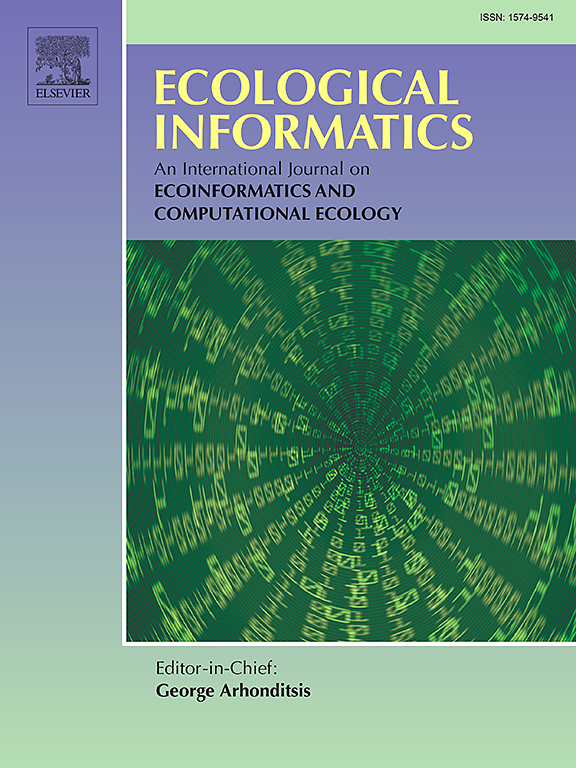Tracing the range shifts of African tree ferns: Insights from the last glacial maximum and beyond
IF 5.8
2区 环境科学与生态学
Q1 ECOLOGY
引用次数: 0
Abstract
African tropical forests are experiencing rapid decline as a result of several factors, including increasing population pressure, recurrent wildfires, selective logging practices, land use changes, intensified agricultural activities, and other social and economic issues. Using MaxEnt, paleoclimatic data, and future climate scenarios, the present study seeks to explore the presence of tree ferns in tropical and Saharan Africa during the Last Glacial Maximum, African Holocene Humid Period (AHHP; ca. 14,500–5000 years ago) and to project the effects of climate change on the distribution of tree ferns in Africa under two future climatic scenarios, Representation Concentration Pathways (RCP) 4.5 and 8.5. Our study reveals that despite a significant increase in precipitation during the AHHP, precipitation distribution was variable and insufficient to support the five tree fern species examined in this study. While some tree fern species have experienced range shifts over time, we found that most of them have maintained their presence within refuge areas that probably endured the late Pleistocene extinction event. These refugia provided a haven for some tree ferns, allowing them to persist and survive amidst challenging and varying environmental conditions. This highlights tree ferns' remarkable adaptability in changing climate as well as the critical importance of these refugial areas in safeguarding their populations during climatic upheaval. Our study further demonstrates that different species respond to climate change differently, with some experiencing minimal range contractions of 2.0 %, up to more than 57.0 % range expansion in other species. Preserving refugia not only safeguards tree fern populations but also contributes to conserving overall forest biodiversity and ecosystem functioning. This knowledge is crucial for implementing targeted conservation actions that promote sustainable forest management and can mitigate the threats posed by climate change and anthropogenic activities in African closed wet forests.
追踪非洲蕨类植物的分布范围变化:从末次冰川极盛时期及其后的洞察力
由于人口压力不断增加、野火频发、选择性伐木、土地用途改变、农业活动加剧以及其他社会和经济问题等多种因素,非洲热带森林正在经历快速衰退。本研究利用MaxEnt、古气候数据和未来气候情景,试图探讨非洲热带和撒哈拉地区在末次冰川极盛时期、非洲全新世湿润时期(AHHP,约14500-5000年前)树蕨的存在情况,并预测在两种未来气候情景(代表浓度途径(RCP)4.5和8.5)下气候变化对非洲树蕨分布的影响。我们的研究表明,尽管在非洲高原水文计划期间降水量显著增加,但降水分布不均,不足以支持本研究中考察的五种树蕨物种。随着时间的推移,一些树蕨类物种的分布范围发生了变化,但我们发现,大多数树蕨类物种都留在了可能经历了晚更新世物种灭绝事件的避难区内。这些避难所为一些树蕨类植物提供了庇护所,使它们能够在充满挑战和多变的环境条件下存活下来。这凸显了树蕨类植物在不断变化的气候中的卓越适应能力,以及这些避难区在气候动荡期间保护其种群的极端重要性。我们的研究进一步表明,不同物种对气候变化的反应各不相同,有些物种的分布区收缩幅度很小,仅为2.0%,而另一些物种的分布区则扩大了57.0%。保护避难所不仅能保护蕨类植物种群,还有助于保护整个森林的生物多样性和生态系统功能。这些知识对于实施有针对性的保护行动至关重要,这些行动可促进可持续森林管理,并能减轻气候变化和人类活动对非洲封闭湿林造成的威胁。
本文章由计算机程序翻译,如有差异,请以英文原文为准。
求助全文
约1分钟内获得全文
求助全文
来源期刊

Ecological Informatics
环境科学-生态学
CiteScore
8.30
自引率
11.80%
发文量
346
审稿时长
46 days
期刊介绍:
The journal Ecological Informatics is devoted to the publication of high quality, peer-reviewed articles on all aspects of computational ecology, data science and biogeography. The scope of the journal takes into account the data-intensive nature of ecology, the growing capacity of information technology to access, harness and leverage complex data as well as the critical need for informing sustainable management in view of global environmental and climate change.
The nature of the journal is interdisciplinary at the crossover between ecology and informatics. It focuses on novel concepts and techniques for image- and genome-based monitoring and interpretation, sensor- and multimedia-based data acquisition, internet-based data archiving and sharing, data assimilation, modelling and prediction of ecological data.
 求助内容:
求助内容: 应助结果提醒方式:
应助结果提醒方式:


